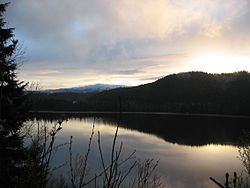Klæbu
| Klæbu kommune | |||
|---|---|---|---|
| Municipality | |||
 |
|||
|
|||
 Klæbu within Sør-Trøndelag |
|||
| Coordinates: 63°16′34″N 10°30′51″E / 63.27611°N 10.51417°ECoordinates: 63°16′34″N 10°30′51″E / 63.27611°N 10.51417°E | |||
| Country | Norway | ||
| County | Sør-Trøndelag | ||
| District | Trondheim Region | ||
| Administrative centre | Klæbu | ||
| Government | |||
| • Mayor (2016) | Kirsti Tømmervold (Ap) | ||
| Area | |||
| • Total | 186.36 km2 (71.95 sq mi) | ||
| • Land | 175.06 km2 (67.59 sq mi) | ||
| • Water | 11.30 km2 (4.36 sq mi) | ||
| Area rank | 337 in Norway | ||
| Population (2010) | |||
| • Total | 5,801 | ||
| • Rank | 185 in Norway | ||
| • Density | 33.1/km2 (86/sq mi) | ||
| • Change (10 years) | 19.0 % | ||
| Demonym(s) | Klæbygg | ||
| Time zone | CET (UTC+1) | ||
| • Summer (DST) | CEST (UTC+2) | ||
| ISO 3166 code | NO-1662 | ||
| Official language form | Bokmål | ||
| Website | www |
||
|
|
|||
Klæbu is a village and municipality in Sør-Trøndelag county, Norway. It is located in the southern part of the Trondheim Region, about 20 kilometres (12 mi) south of the city of Trondheim. The administrative center is the village of Klæbu. The other major village in Klæbu is Tanem.
The village of Klæbu is located along the Nidelva river. The 1.57-square-kilometre (390-acre) village has a population (2013) of 3,187. The population density is 2,030 inhabitants per square kilometre (5,300/sq mi).
Even though agriculture has traditionally been the main industry for Klæbu, the municipality now functions more as a commuter town of Trondheim, where many of Klæbu's inhabitants work or attend school.
It is scheduled to merge with the municipality Trondheim January 1st 2020.
The municipality of Klæbu was established on 1 January 1838 (see formannskapsdistrikt). On 1 January 1899, the small northwestern part of Klæbu (population: 533) was separated from Klæbu to form the new municipality of Tiller.
The Norse form of the name was Kleppabú. The first element is the plural genitive case of kleppr 'rocky hill' - the last element is bú 'rural district'. The district/parish has a lot of small rocky hills.
The coat-of-arms is from modern times; they were granted on 8 July 1983. The silver and blue arms symbolize the Trangfossen waterfall in the Nidelva river, which is now the deepest canyon in Norway measuring 56 meters (183 feet). The river has been of great importance for the local development, for agriculture and hydroelectricity generation, hence the use of the waterfall as a typical symbol for the municipality. The waterfall is no longer visible as that part of the river became part of Bjørsjøen lake after the building of the dam at Hyttfossen.
...
Wikipedia


